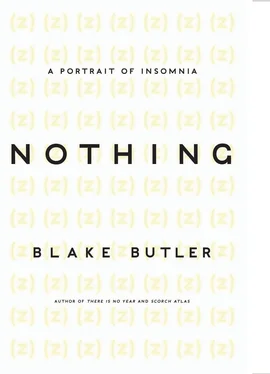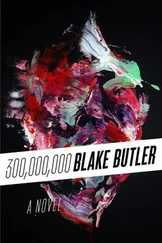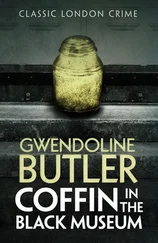Thinking of dreaming as film, then, colors the insomniac state as an entry to the out-of-field, in waking exit of the mind. Sewed off. Seamed in. Constantly in hover and undefined. An uncentered excavation, which in some objects might seem obvious, predictable by context, and yet still is never there. The set of a person’s home in a soap opera, for example, may promise, in its making, that to pull away would reveal more of the house to be like ours, simple, predicted rooms, with mirrors, tables, chairs, and bodies. Or furthermore, the context in which we know the shot is set. That we might know in pulling back we see the cameras, the operators, the undeveloped sections of the warehouse which, in a conceived space, contains the to-be-filmed, and yet there is forever in the looming that unanswered unconscious question. The thing itself becomes dismantled and reassembled every instant by what it isn’t — and it goes on. Some of the out-of-field may be the organs of the body that have been removed or otherwise destroyed, placed concretely out-of-field of the continuum, and yet in some way, by creation, somewhere in there, having been: the reels of film created and then burned; the image in the image covered over, blocked out; what had been upon the field there days or years before, or would be entering the field when the field is no longer watched; what sections cut from all the films and all the books in want of their cleanest shape, in the same way there are those who amputate their own limbs thinking that flesh connected to them is not theirs —some other body on their body, woven into the image of their skin, feeling more themselves in that removal, in that erasure.
The older I get, each time I lie down to go to sleep again, the more it is in resignation from this unending going and its implicated human end — that somewhere, in us, as beings, there must be a wall we cannot breach — a wall that in extant idea gives us reason to keep going in search of it, forever — in search of our own end — if appended by the idea that there too is a further out-of-field — that the space we circle in these hours gives only glimpses, mirrors, and beyond there is something without what. And in the circling, the furor — our endless wanting — all these bodies. The more you want, the more you want. The more you want it , the more it is, all around you, grown out in your hair and teeth.
Here, again today, are words. All day, inside my waking, this fucking infernal typing, racket, click-clack, for which I ignore time I could have given to my father, to my mom, to H., to anyone, to light, to air. Click clack click clack clacky , the most common reason these days I do not sleep. The words shit out inside me, in a spooling, coming out into this box — this white box that will grow large as you allow it, until the memory of the machine becomes overstuffed. Tonight is small. Tonight is everywhere at once, and every image, fat as fuck, bricking my blood.
Fear of Self
Somewhere in this sprawl of hours is my father, and the destruction of his aging brain. Dad, now seventy-three, has been diagnosed with acute dementia. In the dementia, as it opened, he began to forget how to get to places he had been many times before outside our home. He would find himself driving deep into the country in his small car, with a cell phone he could often not remember how to use. I find the meatloaf in the cabinets with the clean dishes. Bowls of cereal wrapped under foil in the freezer. Many days he cannot answer any question. His eyes deep in his head — in the image of someone who has not at all been sleeping — though now sleeps more than he ever has. His usual bedtime of 10 PM drawn back to eight then seven. The other day he went to bed at four in the afternoon. My mother stopping him in the hallway, asking him to come sit with her, it’s not that time yet. “I know what I am supposed to do,” he said.
Recent nights now, among the long sleeping, my dad might not recognize the bed. Suddenly the room is not the room he’s slept in all these hours — my parents having been married more than forty years. He often does not remember the marrying, or what her name is. He talks of going back to the home where he grew up, a farm that since has been sold, the house dismantled. The house, though, still there on that air. The same roads leading to it, as a tunnel. The years he spent there, bodied as a boy. The negative house, in its destruction. The sleep-kill in the flesh. I honestly can’t say, as I write this sentence, that my father will be here by the time I finish with this manuscript, another book . When I say here, I mean in body, as he is already often gone inside the mind, except in moments, in slow glowing. More hours there seems not anyone there in those wet eyes — or worse, the someone once there trapped under many layers, some force within him repeating in reverse. The skin around his skull. The hair. How he will often, in the midst of worst forgetting, put his head down in his hands.
Sometimes standing in the same room with my father now when he looks at nothing and sees nothing and responds to my speaking to him with more gone, I feel as if I have been awake for many years all in one moment and there is nowhere else to go. But I do go. I leave the room, because honestly, I am frightened. And yet at night now I’ve been sleeping better than I ever have. The present terror, perhaps, of certain kinds, forms a kind of other hands, enough to at certain presences hold you under water, even further down, more than the blank rooms overflowing, again, the houses and those years.
In the afternoons my father walks around the house holding keys that do not fit the car he is no longer allowed to drive. His dementia, which he does not believe in, and his recent glaucoma eye condition, which he does not believe in, have at last overcome his ability to respond in traffic, to find his way home. We have had to take his Corvette from him, hide the keys to all cars, as in his frustrated anger he will try to fit into the ignition anything that glints. His waking hours a series of nervous limbs and huffing, a spiral loop of thick obsession over the idea of when he will again be allowed to drive. That he will not, that his eyes aren’t legally okay now, brings furious terror to his skin — the breath and blood underneath his face skin welling as on days when I was adolescent and would test his nerves by saying stupid things. “I’m blind! I’m blind!” he shrieks into the house during day hours, throwing his hands up, in mockery of our concerns. His recent new glasses in their fabric-lined case, which he carries around the house as evidence, in his mind, that he is a prisoner in here, surrounded, though it is less his eyes and more the fact he often does not recognize where he is, that even my mother seems a stranger, that he speaks of his passed parents as if they are waiting for him in an old house that does not exist. We can’t bring up these things to him directly — try explaining a mirage to the air upon which it is formed. Instead, we hold ourselves around him in the air as best we can, try to lead him back in patient speaking to the body of today, paring down the drift with knots of logic—“This is your home.” “There is no one in the glass.” “I am your son.”—though you can see the drift of the machine inside him wavering between actual air and his phantasms. Sometimes when he thinks we are not watching he gathers the keys that fit the storage closet, the doors to underneath the house, going back and forth from where the cars are as if this time these other, tiny keys might fit, much in the way I would wander with the plastic key sets tight in my hands waiting for the day they would find the moving thing that they unlocked. Wishing I could take the childish sense of calm about them that I had then and touch my father’s forehead with it, let him rest. It has been the fastest longest year I can remember, bumping in old rooms where a suddenly descending veil of awful air crawls at the walls.
Читать дальше












